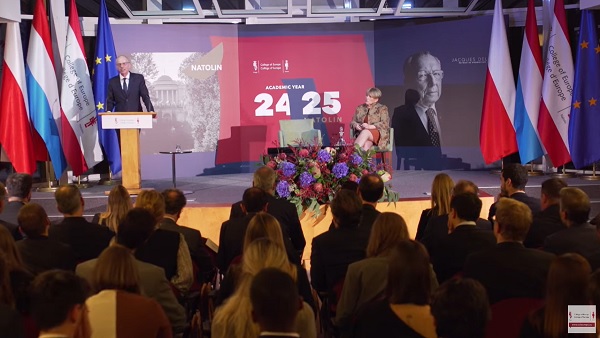 Credit: Screenshot via YouTube
Credit: Screenshot via YouTube
On Monday 4 November 2024, Luxembourg Prime Minister Luc Frieden delivered the keynote speech at the opening ceremony of the Jacques Delors Promotion 2024/2025 at the College of Europe in Natolin, Poland.
The Prime Minister's speech, entitled "Europe. A necessity. An ambition.", addressed several challenges facing Europe today, including defence and foreign policy, migration and Schengen (free movement), competitiveness and the single market, the green and digital transition, EU enlargement and common values, as well as decision-making.
Prime Minister Frieden touched on the history of the European Union, a post-war project "that brought peace, democracy and prosperity" to Europe, and the importance of continuing to work together.
"There are no easy answers to the challenges of our time. Yet, there is one simple truth: countries trying to deal with them on their own will not succeed. But together, we can," he stated.
On the subject of peace, he stressed the importance of unity in defence and advocated discussions on "the need for a European army". He described Russia's "unacceptable invasion of Ukraine" as a "wake-up call", and emphasised the importance of international law, as well as "institutions that encourage dialogue and democracy".
He argued that the EU, "as an important geopolitical player, should have its own permanent seat on the UN Security Council", stressing the value and impact of speaking with "a common European voice".
On the topic of migration and free movement, Prime Minister Frieden said it was "high time that we reaffirm the true spirit of Schengen". He described reintroduced national border controls as "short-sighted", as "a national response to a cross-border problem", and said control must be "regained at out external borders" based on a policy that is "guided by the heart and the mind". He highlighted four aspects here: the guaranteed right to asylum, the need for controlled legal immigration (paired with successful integration), the fight against illegal immigration, and the return of people who are neither eligible for asylum nor a visa.
On competitiveness, he focused on the Single Market and a need to rely more on mutual recognition and harmonisation (and thus less regulation/bureaucracy). He later added that the European competitiveness agenda should be "even broader because our economies need more investment" (from both the public and private sectors). He touched on innovation and research, and the twin green and digital transition. "To bring all of this together, we need a more ambitious industrial strategy that is fit for both the ecological transition and a new geopolitical reality," he said.
Returning to the title of his keynote speech, Luxembourg's Prime Minister described Europe as both a "necessity" and "an ambition, an aspiration to uphold our common values". He added that enlargement should also be viewed from a "strategic perspective", to avoid leaving a "gap" for others "to exploit at our expense". However, enlargement is not "endless", the EU has a "geographical limit", and it should not "take decades" to achieve. He went on to suggest an overhaul of EU decision-making and advocated "a Europe of multiple speeds, of concentric circles, of different levels of integration", depending on how integrated (candidate) countries wish to be.
In his conclusion, Prime Minister Frieden recalled that "history did not just happen; it was made", adding that "the future does not just happen either; we make it happen. Now is our time to act. [...] To dare. To be bold. Because together we can make the future better. And together, we will make it better."








